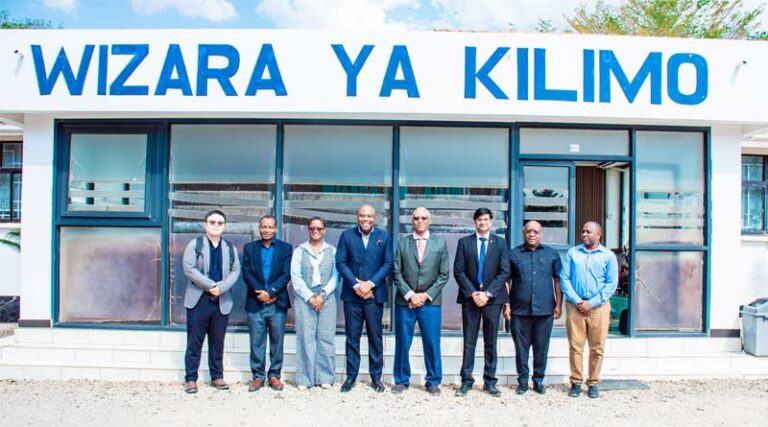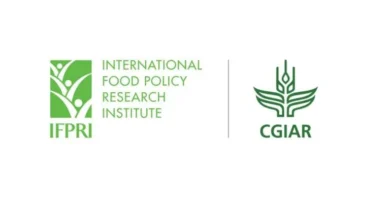
Priorities, progress, and plans: IRRI, TARI, and TaiwanICDF revisit Partnerships In Tanzania
27 October 2025, Tanzania: IRRI, the Tanzania Agricultural Research Institute (TARI), along with the Taiwan International Cooperation and Development Fund (TaiwanICDF), visited the Permanent Secretary of the Ministry of Agriculture in Dodoma, United Republic of Tanzania Honorable Gerald Mweli, to discuss research priorities, partnerships and strategic collaborations in East and South Africa (ESA). The visit precedes a series of discussions during IRRI’s Regional Advancement Meeting in Dar es Salaam. TARI Director General Dr. Thomas Bwana and Director of Research and Innovation Dr. Deusdedith Mbanzibwa accompanied the IRRI delegation, led by IRRI Africa Regional Director Dr. Abdelbagi Ismail, Regional Breeding Lead Dr. Ajay Panchbhai, and IRRI Tanzania Country Representative Dr. Pauline Chivenge. TaiwanICDF Project Manager Mr. Joe Chiu also joined the delegation, expressing interest in collaborating with IRRI and the government of Tanzania.
Dr. Ismail gave a presentation on the historical relations and the progress that IRRI has made in Tanzania, highlighting the vital role the institution is playing in strengthening Tanzania’s rice value chain. This included the development of modern varieties and technological innovations that boost rice productivity and market value, while improving production efficiency and reducing postharvest losses. In Tanzania, rice yields remain low despite the country achieving self-sufficiency mainly through land expansion. Mr. Chiu discussed the ongoing work of TaiwanICDF to support Tanzania’s agriculture sector, where they are currently focusing on vegetable crops. He shared that the organization plans to expand its activities in the country’s rice sector.
Honorable Mweli commended the work that IRRI is doing in Tanzania and acknowledged the heavy reliance on rainfed ecologies as a limitation for rice production in the country. He stated that the Government of Tanzania is working on improving the irrigation infrastructure for rice production. “The Government of Tanzania recognizes rice as a strategic crop for food security and also aims to be the regional leader in rice trade, exporting rice to neighbouring countries to help reduce the gap in regional demands.”, he stated. Permanent Secretary Mweli emphasized a few areas where IRRI can significantly contribute to help Tanzania reach the country’s goal as a regional rice producer and supplier:
- Strengthening seed systems for national institutions and the private sector
New rice varieties must reach farmers faster, so that they benefit from them, with higher yield and better traits that meet the requirements of local consumers and market demands.
- Capacity building for TARI scientists and researchers
Honorable Mweli requested that IRRI contribute to the MSc and PhD training of new TARI recruits to fill the gaps in the current staff structure. This is aligned with IRRI’s priorities in Tanzania, to build the capacities and skills of national partners, as well as young Tanzanian rice researchers.
- Capacity building of farmers and extension systems
Last-mile delivery is crucial to scale up the adoption of new products and technologies. Honorable Mweli values capacity building of extension services in Tanzania, deeming it necessary for each extension officer to receive training at least twice a year. The Government of Tanzania, through TARI, is conducting a few campaigns, among them being the “laboratory to farm campaign”, which aims to enhance the capacity of TARI’s researchers and extension personnel to fast-track the transfer of research findings to farmers and other players in the value chain.
- Regional leadership in rice
The Government of Tanzania aims to become the regional leader in rice production and trade in the region to help narrow the gap in food supply in neighboring countries.
Dr. Ismail reiterated IRRI’s commitments, which are aligned with the directives and strategies outlined by the Permanent Secretary and the Government of Tanzania. Under IRRI’s 2025-2030 Strategy, the institute aims to support Tanzania’s emergence as a continental leader in harnessing rice-based food systems for human and planetary health, at home and abroad. Permanent Secretary Mweli expressed his full support for IRRI obtaining a Host Country Agreement (HCA) in Tanzania. This legal status will enable the institute to achieve stronger and wider partnerships for research and development along the rice value chain in the country.
📢 If You’re in Agriculture, Make Sure the Right People Hear Your Story.
From product launches to strategic announcements, Global Agriculture offers unmatched visibility across international agri-business markets. Connect with us at pr@global-agriculture.com to explore editorial and advertising opportunities that reach the right audience, worldwide.






